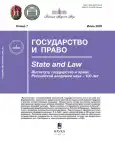Human Rights and Solidarity: Is Balance Possible?
- Authors: Rudenko V.V.1
-
Affiliations:
- Institute of Philosophy and Law of the Urals Division of the Russian Academy of Sciences
- Issue: No 7 (2025)
- Pages: 52-61
- Section: Rights and freedoms of a man and a citizen
- URL: https://journal-vniispk.ru/1026-9452/article/view/306382
- DOI: https://doi.org/10.31857/S1026945225070063
- ID: 306382
Cite item
Abstract
The article examines the problem of correlation of human rights and solidarity in the Russian legal system. It reveals the correlation of the concepts of human rights and solidarity in certain socio-political movements, including socialism, liberalism, and Catholic reformism. The author analyzes the main ways of enshrining human rights and solidarity as constitutional and legal values in the constitutions of foreign states. The article considers constitutionalization of the principle of solidarity in the context of the constitutional reform of 2020. It concludes that the balance of human rights and solidarity within the Russian legal system is predetermined by the shift in emphasis within the discourse of human rights from an individualistic approach to a collective one. Both human rights and solidarity are part of the values that construct the Russian legal system and they do not contradict each other.
About the authors
V. V. Rudenko
Institute of Philosophy and Law of the Urals Division of the Russian Academy of Sciences
Author for correspondence.
Email: emikh.valentina@gmail.com
16 S. Kovalevskoy str., 620000 Yekaterinburg, Russia
References
- Alebastrova I. A. Constitutionalism as a Legal Basis for Social Solidarity. M., 2016 (in Russ.).
- Alebastrova I. A. Social Solidarity as a Factor in the Evolution of Human and Civil Rights and Freedoms // Actual Problems of Russian Law. 2015. No. 2. P. 26 (in Russ.).
- Husserl E. Cartesian Reflections. SPb., 2006 (in Russ.).
- Zorkin V. D. The Essence of Law // News of Higher Educational Institutions. Jurisprudence. 2017. No. 3 (332). Pp. 4–27 (in Russ.).
- Kalinin S. A. Geocultural approach of the ideological research program: on the problem of interaction of liberal and traditional standards // Proceedings of the Institute of State and Law of the Russian Academy of Sciences. 2020. Vol. 15. No. 1. Pp. 94–124 (in Russ.).
- Novgorodtsev P. I. Introduction to the Philosophy of Law: the crisis of modern legal consciousness. M., 2011 (in Russ.).
- Salikov M. S., Goncharov M. V. Constitutional values at a new stage of development of the basic law of the Russian Federation // Herald of the Euro-Asian Law Congress. 2020. No. 1. Pp. 60–68 (in Russ.).
- Skachkova G. S. Development of the idea of a social state and innovations of Article 75.1 of the Constitution of the Russian Federation // Herald of Tyumen State University. Social, economic and legal studies. 2021. Vol. 7. No. 3 (27). Pp. 86–97 (in Russ.).
- Sorokin P. S., Popova T. A. Classical and modern approaches to the study of solidarity: problems and prospects in the context of destructuring // Herald of RUDN. Sociology series. 2021. Vol. 21. No. 3. Pp. 457–468 (in Russ.).
- Ebzeev B. S. State and personality in Russia: social solidarity as a paradigm of domestic constitutionalism // Journal of Foreign Legislation and Comparative Law. 2013. No. 6 (43). Pp. 986–999 (in Russ.).
- Maldonado C. E. Human Rights, Solidarity and Subsidiarity: Essays toward a Social Ontology / Cultural Heritage and Contemporary Changes. Series V. Latin America. Vol. V. 1998.
- Patocka J., Ricoeur P. Essais hérétiques sur la philosophie de l’histoire. Verdiet, 1990.
- Pułło A. Idea solidarności w systemie zasad konstytucyjnych // Gdańskie Studia Prawnicze. Nr 33(1). S. 331–341.
- Richardson-Little N., Dietz H., Mark J. New Perspective on Socialism and Human Rights in East Central Europe since 1945 // East Central Europe. 2019. URL: https://ore.exeter.ac.uk/repository/handle/10871/40082 (accessed: 23.05.2025).
- Shklar Ju. N. The Liberalism of Fear // Rosenblum N. L. Liberalism and the Moral Life. Harvard University Press, 1989. Pp. 21–38.
- Sangiovanni A., Viehoff Ju. Solidarity in Social and Political Philosophy // The Stanford Encyclopedia of Philosophy. Zalta E. N., Nodelman U. (eds.). 2023. URL: https://plato.stanford.edu/archives/sum2023/entries/solidarity/ (accessed: 20.05.2025).
- Vašák K. Human Rights: A Thirty-Year Struggle: the Sustained Efforts to give Force of law to the Universal Declaration of Human Rights // UNESCO Courier. 1977. No. 11. Pp. 29–32.
- Wellman C. Solidarity, the Individual, and Human Rights // Human Rights Quarterly. 2000. No. 22. Pp. 639–657.
Supplementary files










